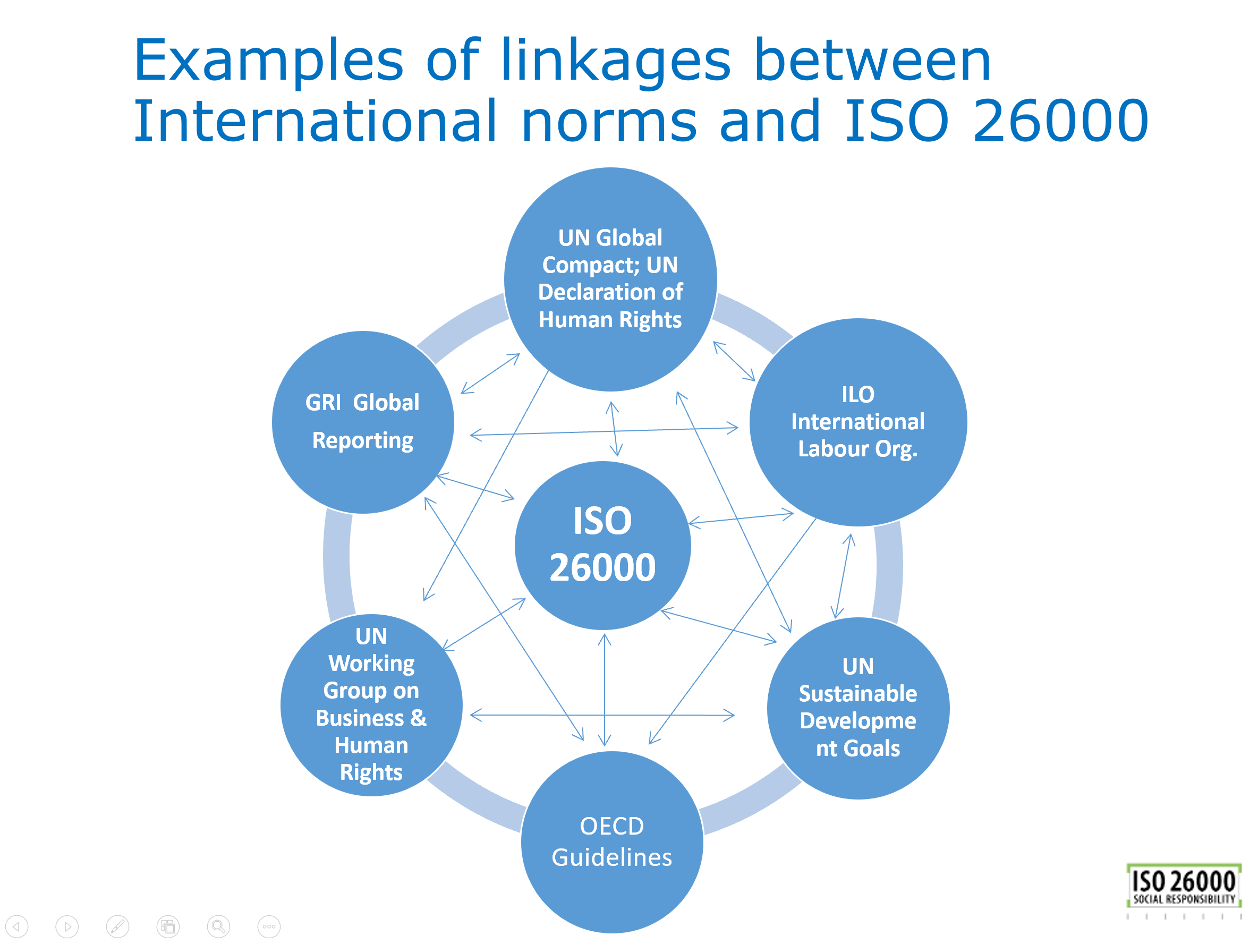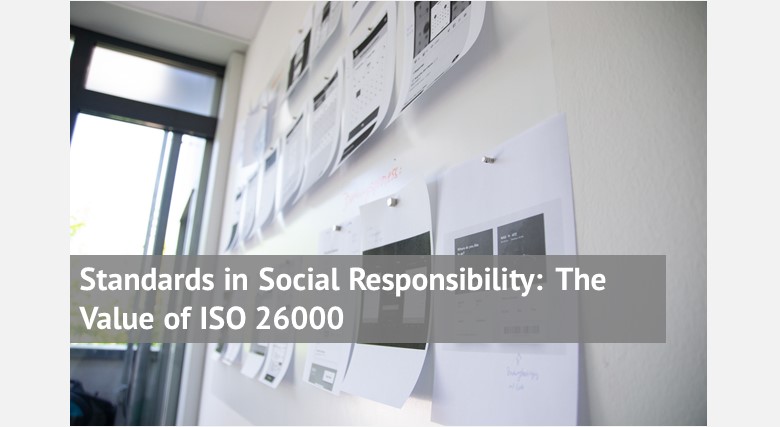ISO 26000 is an international standard developed to help organizations effectively integrate social responsibility into their strategy and operation. Applying ISO 26000 helps organisations implement socially responsible behaviours as part of their values and business practices and thus contribute to sustainable environmental, social and economic development. The standard was launched in 2010 after five years of negotiations among international stakeholders from public, private and third sector representatives and was developed by a working group of about 500 experts, achieving international consensus. Using ISO 26000 to improve Social Responsibility performance In order to fully comprehend the use and purpose of ISO 26000, the attention must be paid to the very definition of “social responsibility”, that the standard provides: “responsibility of an organization for the impacts of its decisions and activities on society and the environment, through transparent and ethical behaviour that
- contributes to sustainable development, including health and the welfare of society;
- takes into account the expectations of stakeholders;
- is in compliance with applicable law and consistent with international norms of behaviour; and
- is integrated throughout the organization and practised in its relationships.”
Supported by seven principles (Accountability, Transparency, Ethical behaviour, Respect for stakeholder interests, Respect for the rule of law, Respect for international norms of behaviour, Respect for human rights), the standard is designed to work in all organisational and cultural contexts and can be used by all types of organizations. Furthermore, the standard seeks to promote a common understanding of social responsibility. Therefore, ISO 26000 is applied within the existing societal, environmental, legal, cultural, political and organizational framework set by local, regional, national norms of behaviour, accepted or expected standards, economic conditions and environment. The standard provides guidance on:
- Concepts, terms and definitions related to social responsibility;
- Background, trends and characteristics of social responsibility;
- Principles and practices relating to social responsibility;
- Core subjects and issues of social responsibility;
- Integrating, implementing and promoting socially responsible behaviour throughout the organization and, through its policies and practices, within its sphere of influence;
- Identifying and engaging with stakeholders; and
- Communicating commitments, performance and other information related.

Examples of linkages between International norms and ISO 26000 (https://www.iso.org/iso-26000-social-responsibility.html)
The structure of ISO 26000 ISO 26000 is a reference document that provides guidance and not a management system standard. It does not contain requirements and, as such, unlike other ISO Standards, cannot be used for certification. According to ISO 26000, first steps of an organization should be to consider two fundamental practices of social responsibility: a) recognizing its social responsibility within its sphere of influence, and b) identifying and engaging with its stakeholders. The standard defines the core (seven) subjects of social responsibility but it is the responsibility of the organization to identify those issues that are relevant and significant to their stakeholders and thus need to be addressed. These seven core subjects are the following:
- Organizational governance (subclause 6.2)
- Human rights (subclause 6.3)
- Labour practices (subclause 6.4)
- Environment (subclause 6.5)
- Fair operating practices (subclause 6.6)
- Consumer issues (subclause 6.7)
- Community involvement and development (subclause 6.8)
The benefits of adopting ISO 26000 standard The aim of ISO 26000 is to aid organizations in addressing their social responsibilities, making social responsibility operational, and identifying and engaging with stakeholders and enhancing credibility of the claims made about social responsibility. The document Benefits in applying ISO 26000 – Selected case studies as a result of the SR MENA Project presents the case studies of organizations that took part in the project (2011-2014) on the uptake and use of ISO 26000 on social responsibility within the Middle East and North Africa (MENA) regions. The Banque Libano-Française, operating in Lebanon recorded the following benefits of ISO 26000: ‘‘reduced energy consumption, increased range of products to reach wider audience, greater involvement in the community, improved reputation, strengthened stakeholder relationships, and greater staff engagement in socially responsible issues’’. Similarly, the Water Authority of Jordan recorded the following benefits: amended vision, mission and strategy to integrate social responsibility principles (SR), enhanced staff and stakeholder satisfaction, increase in the number of contracts including SR-related clauses, new job creations, reduced fuel consumption, and rise in the number of tenders that now include sustainable procurement. COCHEPA in Marocco, active in the packaging industry, recognised the following benefits from ISO 26000adoption: strengthened and clarified values in line with the principles of social, responsibility in the company’s policy, social responsibility promoted to suppliers, reduced CO2 emissions and environmental impact throughout the production chain, improved systems and processes, enhanced competitive advantage, and sustainable development report. The value of ISO 26000 Organizations experience huge pressure from stakeholders to adopt responsible behaviours, act in a more socially responsible manner, and ultimately go beyond legal requirements. ISO 26000 offers recommendations and guidance for organisations of all sizes and industries on how to structure, evaluate, and improve their social responsibility, including stakeholder relationships and community impacts. ISO 26000 helps organizations to “translate principles into effective actions and acting in an ethical and transparent way that contributes to the health and welfare of society”.
Photo by NEW DATA SERVICES on Unsplash

